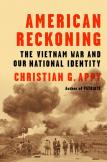A Forgotten Failure?
Fifty years after President Lyndon Johnson ordered a massive escalation of American forces in Vietnam, U.S. policymakers continue to be haunted by the ghosts of that disastrous intervention. Like the French Bourbon kings, who learned nothing and forgot nothing, successive American presidents have repeated the same mistakes that largely destroyed that small rural country and severely damaged the United States for generations.
The culprit, according to Christian Appy, a professor of history at the University of Massachusetts, Amherst, is our nation’s refusal to account honestly for its role in the world that the Vietnam War awakened. In American Reckoning: The Vietnam War and Our National Identity, Appy demolishes the myth of American exceptionalism, the idea that American military force is used only with the best intentions for the greatest good. In showing “a profound disconnect” between the ideals of the public and “the reality of the American war machine,” Appy has written a compulsively readable and highly original account of the influence of Vietnam on Americans’ view of themselves and their foreign policy over the last 50 years.
The first half of the book is a brisk history of the war that highlights the national mood and the colossal errors of the presidents responsible for Indochina policy. Inspired by an intense religious reawakening after World War II, Americans in the 1950s believed their country was a force for good in the world whose ideals could be fulfilled by overseas humanitarian commitments secured by military power. These ideals were tested in Vietnam, where an anti-colonial insurgency ousted the French in 1954 despite massive U.S. military aid. Although the Geneva accords required free elections, President Eisenhower refused to allow them because, as he admitted in his memoirs, Ho Chi Minh would have easily won. Instead, the United States installed an unpopular puppet government and spread false rumors of Communist atrocities to encourage Catholic migration to the south. By the 1960s, in the face of a relentless American bombing campaign in the south that doubled the tonnage the United States dropped in World War II, one-third of the population of South Vietnam fled their rural homes to the cities or were forcibly relocated into armed camps. This strategy proved deeply unpopular and ineffective because, as Appy explains, “military power could not persuade; it could only destroy.” Or as one U.S. military official infamously remarked: “It became necessary to destroy the town in order to save it.”
Although President Johnson’s white and male Ivy-league advisers never really believed they could win the war, they wanted to avoid being perceived as a “paper tiger.” It was essential to show “steely resolve” to forestall the inevitable defeat. Relying on the so-called domino theory, U.S. policymakers believed defeat in Vietnam would lead to the Commu-nist conquest of Southeast Asia. Johnson recalled that Republicans blamed President Truman for the loss of China and feared similar repercussions if he lost Vietnam.
By 1968, however, it was apparent to the American public that the war could not be won. After the Tet offensive exposed the vulnerability of South Vietnam’s urban areas to attack, Walter Cronkite announced on national television that no end to the war was in sight. The administration’s assurances of success, demonstrated by high enemy body counts, could no longer be believed. The antiwar movement and the news media highlighted the immorality of using napalm, condoning torture and massacring civilians at My Lai and the unfairness of the draft, whereby white middle-class college students received exemptions and the working class and minorities did the fighting. Nation-building was a failure. In other words, writes Appy, the war challenged America’s belief in its innate goodness and invincibility.
American Reckoning excels in showing how the public mood drifted to the right after the war ended. President Reagan perpetuated the myth that the U.S. military was forced to fight the war with one hand tied behind its back. The real victims of the war were, according to American conservatives, not the Vietnamese, who lost 3.5 million people, but American soldiers who were still prisoners of war, though few P.O.W.’s were actually being held. Ignoring the suffering of the Vietnamese, the mainstream culture of the 1980s embraced the idea that the war’s deepest shame was the nation’s failure to honor its veterans. By the end of the decade, through movies like “Top Gun,” Americans learned once again to celebrate aggressive masculinity and the military. By contrast, the peace movement was depicted as a group of elitist, cowardly draft-dodgers.
Because the public once again embraced the military, policymakers dispelled the “Vietnam syndrome,” their reluctance to use military force. Appy’s fast-paced descriptions of American military interventions in Lebanon, Grenada, Panama, Somalia, Iraq, Afghanistan and numerous other countries leave the reader somewhat breathless. But his larger point is that the military no longer felt constrained by the memory of Vietnam. In fact, by ending the draft and censoring the media, policymakers discouraged more significant protests against the two Iraq wars, suggesting that they had learned at least some lessons from Vietnam.
Still, eerie parallels between then and now suggest the need for the reckoning Appy demands. The second Bush administration’s nation-building and counterinsurgency program in Iraq recalls similar unsuccessful efforts in Vietnam. President Obama’s reliance on drone strikes in Yemen and Pakistan and bombing against ISIS ignores the failure of the air campaign in Vietnam. American officials, like former Secretary of State Madeline Albright, continue to insist that “we are the indispensable nation.” But as Appy reminds us, this inflated sense of American goodness and failure to learn from the past will only to lead to more disasters.
This article also appeared in print, under the headline “A Forgotten Failure?,” in the April 27, 2015, issue.








